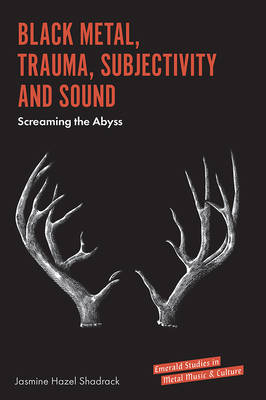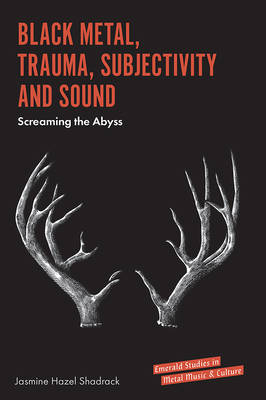
- Afhalen na 1 uur in een winkel met voorraad
- Gratis thuislevering in België vanaf € 30
- Ruim aanbod met 7 miljoen producten
- Afhalen na 1 uur in een winkel met voorraad
- Gratis thuislevering in België vanaf € 30
- Ruim aanbod met 7 miljoen producten
Zoeken
€ 180,45
+ 360 punten
Omschrijving
Black Metal, Trauma, Subjectivity and Sound: Screaming the Abyss weaves together trauma, black metal performance and disability into a story of both pain and freedom. Drawing on her years as a black metal guitarist, Jasmine Hazel Shadrack uses autoethnography to explore her own experiences of gender-based violence, misogyny, and the healing power of performance.
This profoundly personal book offers a detailed explanation of autoethnography, followed by a careful exposition of the relationship between metal and gender, considering - among other things - how women are engaged with by metal music culture. After examining the various waves of black metal and how this has impacted black metal theory, the book moves on to consider female performers and performance as catharsis, including a discussion of the author's work as guitarist and vocalist with the black metal band Denigrata and her alter-ego, the 'antlered priestess' Denigrata Herself. The book concludes with some thoughts on acquired disability, freedom and peace.
The book includes a foreword from eminent gender researcher Rosemary Lucy Hill, a guest section from metal scholar Amanda DiGioia, an epilogue from Rebecca Lamont-Jiggens (a legal pracademic specialising in disability), suggestions of sources of help for those in abusive relationships and further reading for those wishing to learn more about black metal theory.
This profoundly personal book offers a detailed explanation of autoethnography, followed by a careful exposition of the relationship between metal and gender, considering - among other things - how women are engaged with by metal music culture. After examining the various waves of black metal and how this has impacted black metal theory, the book moves on to consider female performers and performance as catharsis, including a discussion of the author's work as guitarist and vocalist with the black metal band Denigrata and her alter-ego, the 'antlered priestess' Denigrata Herself. The book concludes with some thoughts on acquired disability, freedom and peace.
The book includes a foreword from eminent gender researcher Rosemary Lucy Hill, a guest section from metal scholar Amanda DiGioia, an epilogue from Rebecca Lamont-Jiggens (a legal pracademic specialising in disability), suggestions of sources of help for those in abusive relationships and further reading for those wishing to learn more about black metal theory.
Specificaties
Betrokkenen
- Auteur(s):
- Uitgeverij:
Inhoud
- Aantal bladzijden:
- 256
- Taal:
- Engels
- Reeks:
Eigenschappen
- Productcode (EAN):
- 9781787569263
- Verschijningsdatum:
- 18/12/2020
- Uitvoering:
- Hardcover
- Formaat:
- Genaaid
- Afmetingen:
- 150 mm x 231 mm
- Gewicht:
- 476 g

Alleen bij Standaard Boekhandel
+ 360 punten op je klantenkaart van Standaard Boekhandel
Beoordelingen
We publiceren alleen reviews die voldoen aan de voorwaarden voor reviews. Bekijk onze voorwaarden voor reviews.








